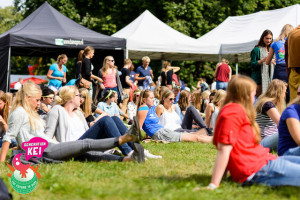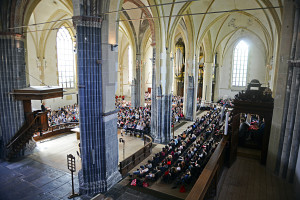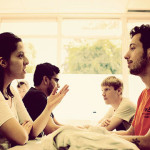Merger of KEI week, ESN intro possible
ESN’s introduction week for the new semester is kicking off this weekend for incoming international students. There is no comparable event for Dutch students half way through the academic year, but would it ever be possible to combine the KEI week and ESN’s introduction week in the fall?
Integration
Luut Kroes, director of the Education and Students department at the RUG, would like to see it happen. ‘We would prefer for international and Dutch students to integrate, which is why it is ideal for them to do activities together. Currently, few international students take part in the KEI week, and even fewer Dutch students participate in the Welcoming Week. We have to take a look at that together.’
The KEI (which stands for Kommissie Eerstejaars Introductie – Commission First Year Introduction) week has taken place in some form in Groningen since 1969, and Nienke van Sligter, current chairperson for the KEI organisation, says that certain traditions have developed over time.
‘Student organisations present themselves to the students during the KEI week, which is followed by their own introduction activities in August’, Van Sligter says. ‘By September, that introduction time has already passed.’
‘Most internationals choose not to come in August, which is why the intro week is usually in September’, she says. That is often because students who live in SSH housing cannot move into their rooms until the last week of August. However, Van Sligter says that the KEI organisation has reached out to SSH about the possibility of making the lease terms more flexible to enable internationals to arrive earlier.
Missing out
Van Sligter recognises that the internationals miss out on a chance to get to know certain parts of student life because the intro weeks for Dutch and international students are at different times. ‘And that is the whole reason that we organise the KEI week: to share the activities that you can do as a student, what the city has to offer and to give students the chance to meet new people.’
ESN’s branch in Groningen has not been around quite as long as the KEI week: it was founded in 1989. Current chairperson Jannick Brusse says that in theory, the idea of combining the weeks sounds great. But in reality, it’s tricky. ‘The KEI week is somewhat fixed in time because the social fraternities are designed in such a way that their activities can’t be held any earlier.’ It would also not be an option for ESN to move their week any later because it would be in conflict with the first week of the academic year.
Earlier isn’t a good option for them, either. ‘The problem is that the KEI week is usually at least two or three weeks before our event, and we would have to move our activities up’, Brusse says. ‘We are also dependent upon the welcoming ceremonies of the RUG and the Hanze. People can sign up for our activities after the ceremonies, but the KEI organisation is completely independent of that.’
Academic year
If the events were to merge at some point, Brusse thinks that moving the KEI week closer to the beginning of the academic year would make it likelier that the most international students could also attend.
One issue that also stands in the way of internationals joining in on more traditionally Dutch activities is the fact that some study-based fraternities have their introduction weekend during ESN’s introduction activities. Brusse thinks that changing the study fraternity weekends would make more sense, at least initially. ‘I think that would be a smaller and easier step to take than to combine our activities with the KEI week.’
Matthijs Katz, chairperson of CUOS, emphasises that the notion of combining the events is still merely a suggestion. ‘It’s simply something to strive toward in the medium- to long-term’, he says. ‘As increasingly more international students come to Groningen, for the sake of integration with the Dutch students, it’s preferable for everyone to take part in the same introduction.’
Give and take
CUOs is well aware of the obstacles that stand in the way, however. ‘We know that the implementation of that idea could be stymied by the late availability of housing and the introduction activities of the fraternities, and how we can work around that remains to be seen.’
Kroes says that either way, the KEI organisation and ESN will have to compromise to make it happen at some point. ‘Both sides will have to give and take on certain things. The last time that we discussed changes to the KEI week, it took us five years, just to give an indication of how complicated it can be. But we have to discuss it.’








